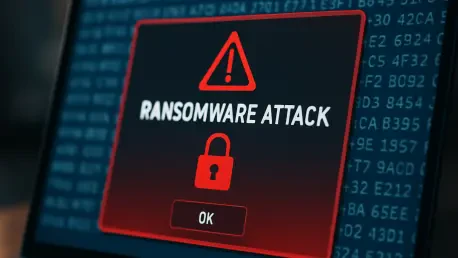In a digital age where cyber threats loom large over businesses worldwide, a recent ransomware attack on Askul, a Tokyo-based retail giant, has sent shockwaves through Japan’s retail and logistics sectors, highlighting the urgent need for robust cybersecurity measures. Over a single weekend, the attack paralyzed Askul’s three key e-commerce platforms—Askul, Lohaco, and Soloel Arena—halting online orders, shipments, and customer support. This incident, affecting not just Askul but also major partners like Muji and Loft, has sparked intense discussion among cybersecurity experts, industry leaders, and business analysts. The purpose of this roundup is to gather diverse perspectives on the attack’s implications, explore varying opinions on Japan’s cybersecurity readiness, and compile actionable tips for businesses navigating similar risks.
Unpacking the Askul Attack: Diverse Views on Impact and Response
Operational Fallout: What Experts Are Saying
The immediate impact of the ransomware attack on Askul has drawn sharp attention from cybersecurity professionals. Many point out that the complete shutdown of online orders, user registrations, and shipments across Askul’s platforms reveals a critical lack of failover mechanisms. Industry observers note that such a sweeping disruption—extending even to customer support—underscores how deeply integrated and vulnerable digital systems have become in retail operations.
Others highlight the uncertainty surrounding data breaches as a major concern. With Askul still investigating whether personal or customer information was compromised, some analysts argue that the potential for data leaks could overshadow operational losses in the long term. This perspective emphasizes the need for transparency in communicating risks to stakeholders, a step seen as vital to maintaining trust during recovery.
A third angle focuses on recovery timelines, with differing views on balancing speed and caution. While some experts advocate for rapid system restoration to minimize financial damage, others warn that rushing could overlook hidden vulnerabilities or embedded malware, risking further attacks. This debate reflects broader tensions in managing cyber crises within high-stakes industries.
Ripple Effects: Partner Disruptions Under Scrutiny
The cascading effects on Askul’s retail partners, such as Muji, Loft, and Sogo & Seibu, have also sparked varied commentary. Some industry voices stress that Muji’s suspension of online shopping and app services—while physical stores remain unaffected—demonstrates the fragility of shared logistics networks. This viewpoint suggests that over-reliance on a single provider like Askul amplifies risks across the retail ecosystem.
In contrast, a different perspective praises the collaborative efforts between Askul and its partners to restore normalcy, even without a clear resumption date. Certain business analysts argue that this teamwork, though strained by uncertainty, shows resilience and a willingness to adapt under pressure. They see it as a potential model for handling future disruptions, provided communication remains consistent.
Yet another opinion focuses on systemic flaws, with critics arguing that Japan’s retail sector must diversify logistics dependencies to avoid such widespread fallout from a single point of failure. This stance calls for structural changes over temporary fixes, urging companies to rethink supply chain strategies in light of growing cyber threats.
Japan’s Cybersecurity Landscape: Conflicting Opinions on Readiness
Rising Threats: A Consensus on Growing Risks
Across the board, there’s agreement that cyber incidents in Japan are escalating, with the Askul attack fitting into a troubling pattern. Recent breaches at companies like Asahi, targeted by the Qilin ransomware gang, and Sagawa Express, which faced unauthorized account logins, are often cited as evidence of increasing sophistication among attackers. Many cybersecurity specialists warn that international ransomware groups are exploiting gaps in regional defenses.
However, opinions diverge on the root causes of Japan’s vulnerability. Some industry watchers attribute the issue to a lag in adopting advanced protective technologies, suggesting that many businesses prioritize operational efficiency over security investments. This critique points to a cultural hesitance to allocate significant resources toward unseen threats until a crisis strikes.
A contrasting view holds that the problem lies in a lack of skilled personnel rather than technology alone. Certain experts argue that even with cutting-edge tools, the shortage of trained cybersecurity professionals in Japan hampers effective implementation and response. This perspective pushes for greater emphasis on workforce development alongside infrastructure upgrades.
Economic Consequences: Debating the Hidden Costs
The financial toll of the Askul attack has also generated diverse analyses. Many business consultants underscore the direct losses from halted operations, not just for Askul but for interconnected supply chains reliant on its logistics. They caution that prolonged downtime could erode market share and disrupt consumer confidence in affected retailers.
On the other hand, some economic analysts focus on long-term reputational damage as the greater threat. They contend that even if systems are restored quickly, the perception of insecurity could deter customers and partners from engaging with compromised platforms. This opinion highlights the intangible costs of cyber incidents, often harder to quantify than immediate revenue hits.
A third viewpoint explores global comparisons, with some experts noting that ransomware recovery costs are rising worldwide. They suggest that Japan’s retail sector must brace for similar trends, potentially reshaping business strategies to include higher budgets for cybersecurity and crisis management. This forward-looking analysis ties local incidents to broader international challenges.
Practical Takeaways: Tips from the Field
Strengthening Defenses: Collective Recommendations
Amid the varied opinions, there’s a shared call for actionable steps to bolster cybersecurity. Many industry leaders recommend investing in robust frameworks, including multi-layered encryption and real-time threat detection systems. Such measures, they argue, can prevent or mitigate the scale of attacks like the one on Askul.
Another widely endorsed tip is the importance of regular system audits to identify vulnerabilities before they are exploited. Cybersecurity consultants often stress that proactive assessments, coupled with employee training on phishing and other entry-point risks, form a critical first line of defense. This advice targets both technical and human factors in security protocols.
Finally, several voices advocate for cross-industry collaboration to combat ransomware. Sharing threat intelligence and best practices among businesses, especially in interconnected sectors like retail and logistics, is seen as a way to build collective resilience. This approach aims to transform individual crises into opportunities for sector-wide improvement.
Policy and Advocacy: Broader Solutions
Beyond company-level actions, some experts push for stronger national policies to address cyber risks. They suggest that government incentives for cybersecurity adoption, alongside stricter regulations on data protection, could drive systemic change. This perspective sees public-private partnerships as essential to closing existing gaps.
A differing opinion emphasizes advocacy at the corporate level, urging businesses to lobby for standardized security benchmarks across industries. Proponents of this view believe that voluntary compliance with high standards can preempt the need for heavy-handed regulation while fostering a culture of accountability.
Additionally, there’s a call for public awareness campaigns to educate consumers and small businesses about digital risks. Some analysts argue that an informed stakeholder base can pressure companies to prioritize security, creating a bottom-up demand for safer practices in the retail and digital landscapes.
Reflecting on the Roundup: Next Steps After the Askul Crisis
Looking back, the ransomware attack on Askul served as a pivotal moment that exposed critical weaknesses in Japan’s retail and logistics networks, sparking a wide array of expert opinions on both immediate impacts and long-term risks. The discussions revealed a consensus on the escalating nature of cyber threats, though solutions ranged from technical upgrades to policy reforms. Moving forward, businesses were encouraged to adopt a multi-pronged approach—investing in advanced defenses, fostering industry collaboration, and advocating for stronger national guidelines. As the retail sector rebuilds, exploring further resources on cybersecurity trends and joining cross-sector forums could provide deeper insights and practical tools to prevent future disruptions.









